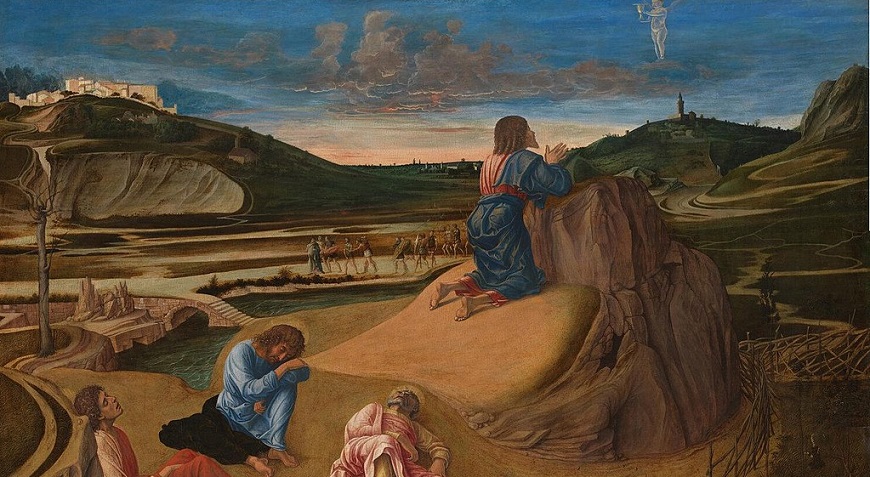Garden of Gethsemane
Come join me in the garden now,
_I need your company.
I’ve never been so frightened, friends,
_please don’t abandon me.
Tomorrow they’ll profess my guilt,
_they’ll paint my blasphemy.
Leaving Pilate just one choice:
_to hang me by decree.
They’ll hand me to an angry crowd
_ceremoniously.
Apostle Peter will deny
_knowing me times three.
Along the road, Veronica
_will be so comforting.
Shedding tears, she’ll wet a cloth
_and wipe my forehead clean.
And when I stumble to the ground
_the guards will intercede
by charging Simon with my cross
_—he’ll bear it willingly.
Alas, they’ll nail my hands and feet
_high on Calvary,
where a thief will ask for grace
_—that I’ll guarantee
But now I pray to God for strength
_to angels I do plea;
I also seek my friends’ embrace,
_please don’t abandon me.
Thomas Beckman is a physician in Rochester, Minnesota. His poems are published or forthcoming in Annals of Internal Medicine, Gray’s Sporting Journal, Midwest Zen, and Plexus Literary Review.


















Thomas, “Veronica” should be explained in a footnote for those unfamiliar with the legend. “No one by the name of Veronica is ever mentioned in the Bible, but tradition and legend assign the name to the woman who suffered for twelve years with a flow of blood until she touched the hem of Christ’s garment and was healed (Mark 5:25–34; Matthew 9:20–22; Luke 8:43–48). According to the legend of Veronica, which has various modifications and evolutions throughout history, this same woman was present as Jesus Christ passed by on His way to be crucified. Moved by His suffering, she removed her head-cloth, or handkerchief, and gave it the Lord to wipe the sweat and blood from His face. When Jesus handed the cloth back to her, the image of His face remained imprinted on it. The fabled cloth became known as the Veil of Veronica, and the cloth itself was said to have miraculous curative properties.” (Source: gotquestions.org) This would be an excellent poem for the Easter season.
As a physician in Minnesota, I wonder if you ever knew my second cousin, Dr. Byron Backus of the Cloque Clinic or my other Doctor Backus relatives, like Dr. Teresa Backus?
The name “Veronica” is simply a Latinization of the original Greek name Beronike, which means “bringer of victory” in the koine Greek of that time. It strongly suggests that the woman in question was Hellenic. The Roman province of Judaea was populated by a mixture of races and ethnicities.
Roy and Joseph, thank you for this interesting history regarding Veronica, which provides important context for the poem. Roy, to answer your question, I do not have the pleasure of knowing your relatives in Minnesota – I do hope you and your family are doing well.
This is beautiful and so moving. I didn’t know that the woman who touched the hem of Jesus’ cloak was Greek. I thought she was a Jew. At least that’s how it imagined her. And thanks for this story about Veronica.
We don’t know if the two women were identical. That idea is a later tradition, with no backing in the Gospel texts.
The poem mentions three personal names (Peter, Veronica, Simon), and this individualizes the poet’s more general focus on the immense importance of friends to Jesus at this last private moment of his life. The moment reveals Jesus’ divine foreknowledge of what is to happen during the next day, while at the same time making Him fully human with the emotions of fear, dread, and need for friendly companionship. I can’t help but recall the same moment in Kazantzakis’ Last Temptation of Christ. The last temptation is to lead a normal human life, instead of going through the agonizing death meant to atone for the sins of humanity. Jesus’ asks himself what would be different in the world if he chose to be a respected rabbi rather than the Redeemer. He has a panoramic vision showing that the world would remain exactly as it was–but he notices one small difference. In Judea, there would be a small group of vagrant madmen wandering the countryside with no purpose to their lives. These are his friends. He makes the decision to redeem humanity out of compassion for them. That was Kazantzakis’ way of emphasizing their importance to Him. From a human standpoint, the divine Redeemer went through his excruciating passion to give meaning to the lives of his friends. You’ve chosen another way, Thomas, to show the overwhelming depth of human feeling in the God-Man.
Thank you, Margaret for that insightful explanation. This makes Thomas Beckman’s poem even more meaningful to me
Rohini and Margaret, thank you both for taking the time to read and comment on my poem. You provided me with valuable learning. Margaret, I was unaware of Jesus’s last temptation to live the worldly life of a rabbi. Yes, it is his humanness and prescience (and courage) that I was hoping to convey – you articulated this so well!